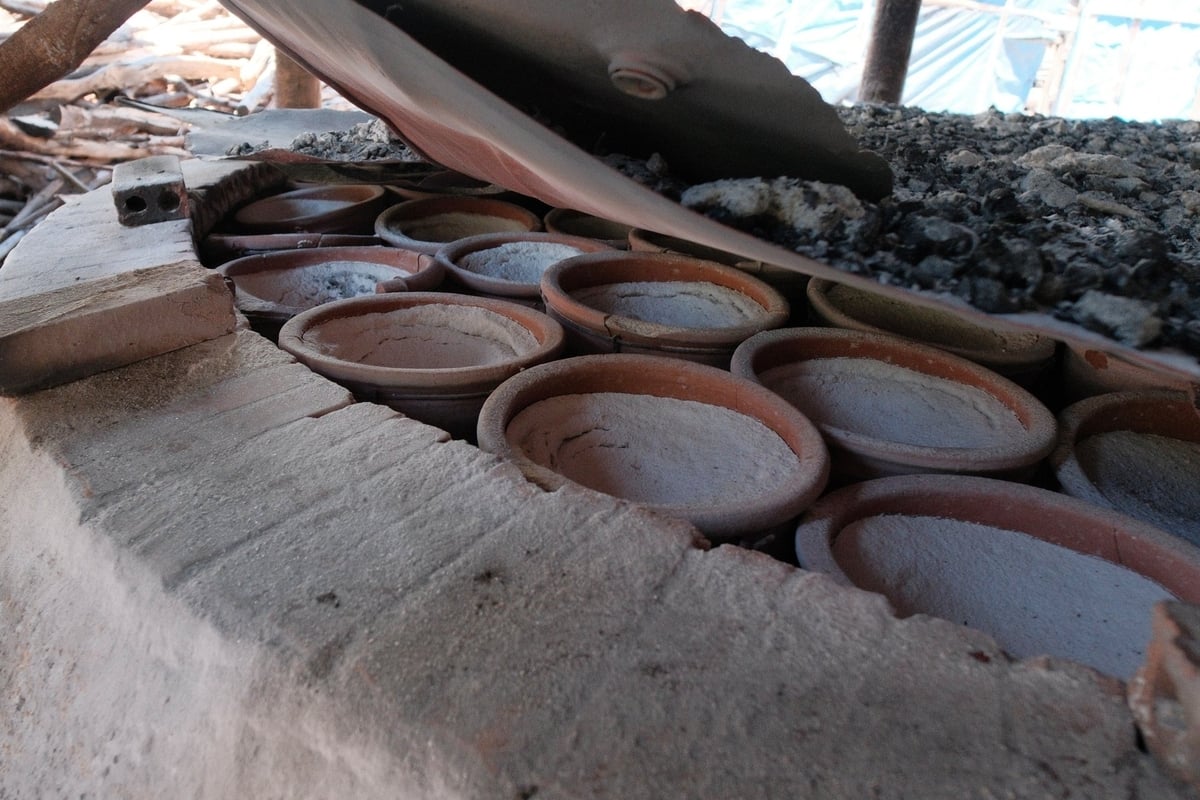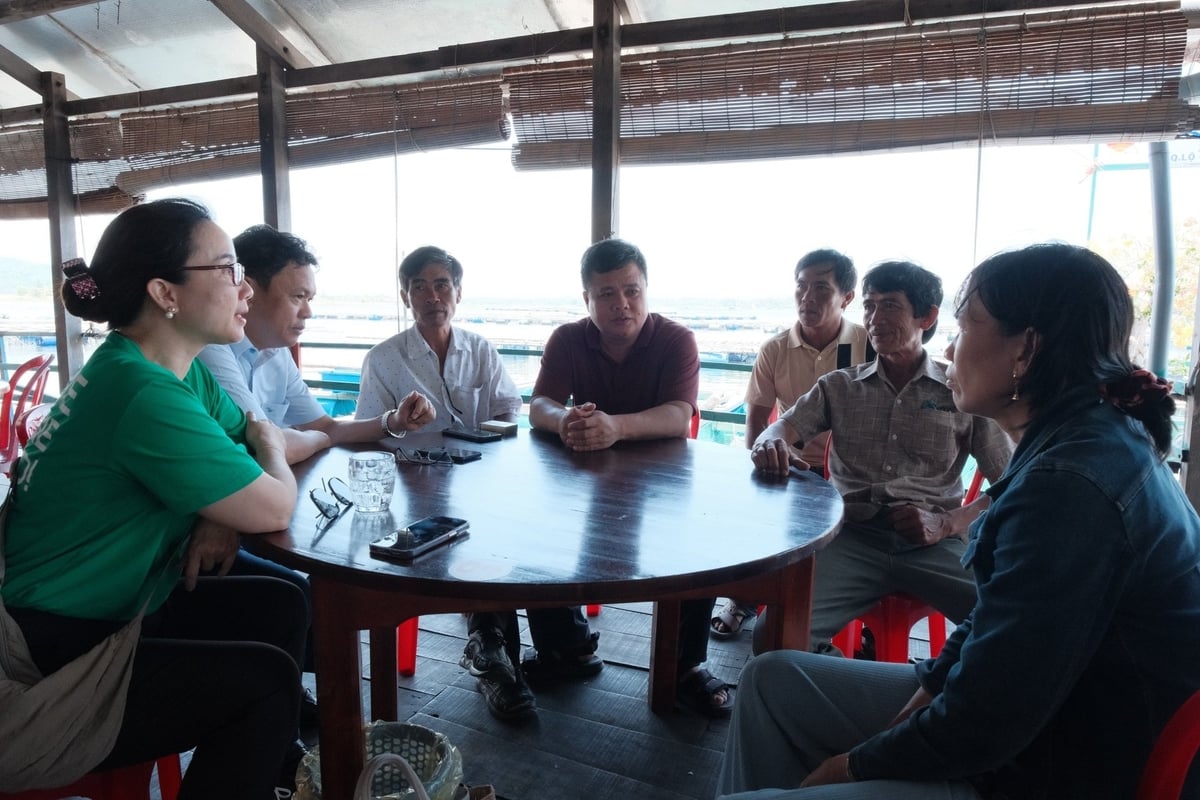May 30, 2025 | 05:38 GMT +7
May 30, 2025 | 05:38 GMT +7
Hotline: 0913.378.918
May 30, 2025 | 05:38 GMT +7
Hotline: 0913.378.918

Tuyet Diem salt village strives to become a tourist attraction, promoting its unique cultural values and 300-year history. Photo: Quynh Chi.
The salt-making tradition in Tuyet Diem has lasted more than 300 years. During the French colonial period, salt from this area held such value that the colonial government built a large warehouse right in the fields and posted guards to protect it.
Today, the People's Committee of Phu Yen province has recognized Tuyet Diem salt village and aims to promote it as a tourist attraction, thanks to its unique culture and rich history. Tuyet Diem Cooperative, established in 1979 with 430 participating households, has grown to 850 members who directly produce salt across more than 120 hectares, maintaining a collective economic model.
However, as salt production still relies heavily on manual methods and is subject to weather conditions, economic returns remain low. The average annual income of salt-making households in Tuyet Diem is approximately 10 million VND, making life difficult.
In response, the Farmers’ Association of Phu Yen province is proposing the project “Enhancing the value and diversifying Tuyet Diem salt products,” with support from the Global Environment Facility's Small Grants Program (GEF SGP) and the United Nations Development Program (UNDP).

Tuyet Diem salt is produced using the traditional method, simmered in a wood-fired oven for 24 hours before being brought to market. Photo: Quynh Chi.
According to Mr. Phan Xuan Hanh, Chairman of the Farmers’ Association of Phu Yen province, climate change has worsened conditions for salt production. Salt depends entirely on weather, so storms, monsoons, and high humidity reduce output and cause major losses during the season. Abnormal temperature spikes also slow evaporation and lower salt quality.
Salt workers in Tuyet Diem continue to toil manually under the scorching sun, walking barefoot across hot fields, carrying seawater, drying, raking, and hauling salt with only human power. Without processing technology, they cannot produce clean or specialty salts, which keeps product value low and leaves the cultural and economic potential of the village untapped.
Mr. Nguyen Ngoc Binh, Chairman and General Director of Tuyet Diem Cooperative, shared, “We want to produce salt not just to create jobs, but also to preserve our traditional culture.” The cooperative has mobilized various capital sources and sought support from the Government and local authorities to gradually overcome challenges. Mr. Binh emphasized that the cooperative aims to develop salt products linked to community tourism and experiential activities, creating sustainable added value for the locality.

GEF SGP National Coordinator Nguyen Thi Thu Huyen (outer left) and Chairman of Phu Yen Farmers' Association Phan Xuan Hanh (second from left) discuss with a group of typical salt farmers. Photo: Quynh Chi.
According to Ms. Nguyen Thi Thu Huyen, National Coordinator of the Global Environment Facility’s Small Grants Program (GEF SGP), Tuyet Diem has been selected as one of three salt-making projects supported by UNDP in Vietnam, and one of 200 standout projects nationwide under a program focusing on conservation, climate change adaptation, tourism development, livelihood improvement, and waste management.
The GEF SGP representative in Vietnam praised the Farmers’ Association of Phu Yen province for boldly proposing and developing the project and confirmed that Tuyet Diem will directly receive and implement the planned activities. Ms. Huyen explained that salt making is not just about production, but is deeply connected to indigenous knowledge and coastal village culture, while also offering opportunities for green and digital transformation through product traceability systems. “That is why GEF SGP chose to develop the salt industry as a starting point to spark conservation and development initiatives in Phu Yen,” she affirmed.
The project has also drawn the active participation of Dai Huu Travel Company Limited, a pioneer in testing salt field experience tours and surveying tourist interest. Recently, the company worked with the Hoan Kiem Lake and Hanoi Old Quarter Management Board to organize an exhibition showcasing the potential and unique features of Tuyet Diem Salt Village.
The project aims to transform Tuyet Diem into a model of sustainable rural tourism, preserving the ecological environment while upgrading infrastructure, including water channels, reception areas, and sanitation systems. These efforts will help build trust and attract domestic and foreign visitors to Song Cau, Phu Yen.
Translated by Quynh Chi
/2025/05/25/4127-3-073637_820.jpg)
(VAN) Thanks to the promotion from an FAO-implemented project, vegetable production in greenhouses in Moc Chau has seen strong development, from 1.5 hectares in 2021 to nearly 50 hectares in 2024.

(VAN) FAO has recently supported USD 140,000 to implement the project 'Risk mitigation human-animal interface risks through disease control initiatives in pig farming.'

(VAN) The People's Committee of Tra Vinh province has approved an adjustment to the investment policy for the Green Hydrogen Plant project, increasing its area to approximately 52.76 hectares.
![Reducing emissions from rice fields: [2] Farmers’ commitment to the soil](https://t.ex-cdn.com/nongnghiepmoitruong.vn/608w/files/news/2025/05/05/dsc08881jpg-nongnghiep-140632.jpg)
(VAN) Clean rice cultivation model in Thuong Tan commune, Bac Tan Uyen district, is assisting local residents in achieving sustainable agriculture by substantially reducing costs, increasing productivity, and protecting the environment.

(VAN) At the conference to disseminate Resolution No. 68, AgriS introduced its digital agricultural ecosystem and reaffirmed its commitment to accompanying the Government in promoting private sector development and sustainable agriculture.

(VAN) 'Blue Ocean - Blue Foods' initiative is designed to restore marine ecosystems and establish sustainable livelihoods for local communities by cultivating a minimum of 1,000 hectares of cottonii seaweed in the first three years.
/2025/05/21/4642-3-112707_603.jpg)
(VAN) The V-SCOPE project has made direct contributions to three out of six pillars of the Comprehensive Strategic Partnership between Vietnam and Australia.